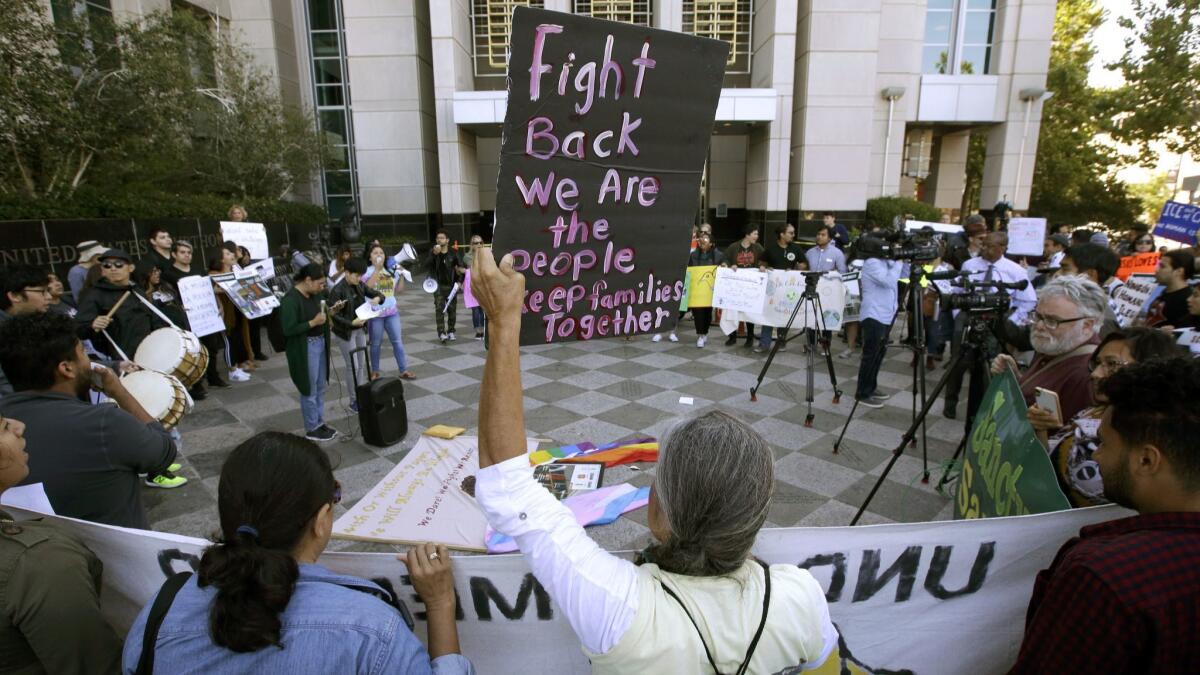9th Circuit judges appear skeptical of challenge to California’s sanctuary laws

A federal appeals court appeared skeptical Wednesday of efforts by the Trump administration to throw out California’s sanctuary laws.
During a hearing, a three-judge panel of the U.S. 9th Circuit Court of Appeals considered an appeal of a lower-court decision upholding most of the package of state laws.
The judges appeared unlikely to block the centerpiece of the package — a law that prohibits police and sheriff’s officials from notifying immigration authorities of the release dates of immigrant inmates.
The Trump administration has argued that the state was creating obstacles to enforcement of immigration laws.
Judge Milan D. Smith Jr., appointed by President George W. Bush, acknowledged that California’s law made the work of immigration agents more difficult, but suggested it was not illegal.
“Because it’s an obstacle, it doesn’t mean it is illegal, right?” he said.
Smith also said that requiring states to help immigration officers would probably violate the U.S. Constitution.
“I am not seeing a violation of federal law by the state of California,” he said, adding that the prohibition on helping immigration authorities was “inconvenient, no doubt.”
Judge Andrew D. Hurwitz, an appointee of President Obama, suggested there was no federal law that requires state cooperation.
“Are you entitled to the aid of the state government in enforcing the immigration laws?” he asked.
At another point, Hurwitz asked, “If there is no affirmative obligation to help, is the failure to help an obstacle?” He added: “They are not required to be helpful, are they?”
He suggested the law posed an obstacle to immigration agents only because “it makes their job harder.”
“There is nothing in this statute that allows [the state] to prevent you from taking custody” of immigrant inmates after their release from state jails and prisons, he said.
Judge Paul J. Watford, also an Obama appointee, asked several questions about whether immigration authorities could still do their jobs even without California’s help.
The Trump administration sued California in March 2018 to invalidate three sanctuary laws.
The other two laws allowed the attorney general to inspect immigration facilities and restricted employers from cooperating with immigration agents.
The 9th Circuit asked more critical questions about those laws but did not indicate clearly how it would rule.
Hurwitz appeared concerned about the provision in the law giving the attorney general access to immigration facilities.
He asked if the court could simply block a provision in the laws without overturning them outright. A lawyer for the state said the court could do that.
U.S. District Judge John A. Mendez, appointed by George W. Bush, upheld the first two laws, rejecting only a provision in the third that established fines for private employers who voluntarily allow immigration agents to visit workplaces.
Twitter: @mauradolan
More to Read
Start your day right
Sign up for Essential California for news, features and recommendations from the L.A. Times and beyond in your inbox six days a week.
You may occasionally receive promotional content from the Los Angeles Times.







